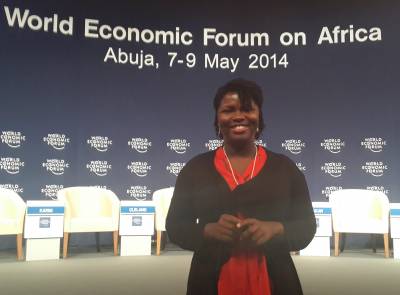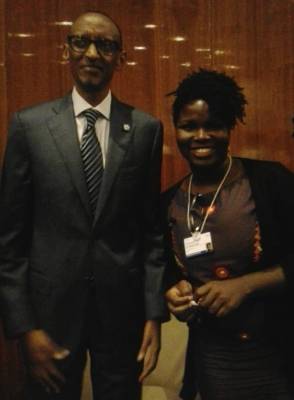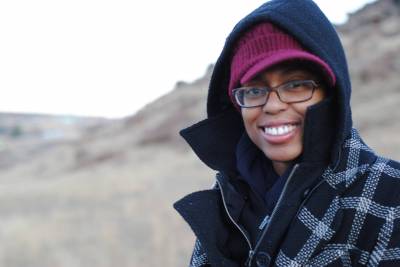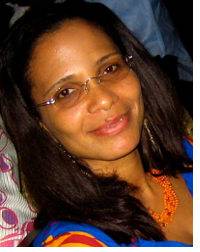“These are high level meetings and most of the time, there are no representations for the arts or children. It’s an economic meeting where they discuss health, security, etc. But what about issues related to the arts, authors, illustrations, children and what we are feeding their minds with? So it was an honor to have been part of this extremely important discussion to contribute our perspectives to how we think the future of Africa should be shaped.”
Those were the words of Executive Director of Golden Baobab, Deborah Ahenkorah, who was present at this year’s World Economic Forum on Africa in Abuja. The World Economic Forum is an international institution committed to improving the state of the world through public-private cooperation. It engages political, business, academic and other leaders of society in collaborative efforts to shape global, regional and industry agenda. Together with other stakeholders, it works to define challenges, solutions and actions, always in the spirit of global citizenship.

During the forum, Miss Ahenkorah was on a panel that discussed Education in Africa and she recalls, “I shared on education and my view was - as much as education focuses on quality, it should not over-run the basics of what information you are providing the children. As we are building schools and libraries, we should pay extreme attention to what our children are being taught because this influences their thinking pattern.”
The World Economic Forum was preceded by a three-day Summit of Global Shapers in Africa. Global Shapers Summit is a gathering of 100 young people in Africa who are doing interesting works that are impacting the continent. Participants of the summit interacted with Rwandan President, Paul Kagami and Former President of Brazil, Lula Da Silva. The highlight for Miss Ahenkorah was when Former Brazilian President walked into the room to a rousing applause and according to her, “Mr. Lula went round to shake the hand of every single Global Shaper, looking each of us in the face with a genuine smile. Key take away from the summit's conversation was: you don't need qualifications to bring about change. You only need to listen to the problems of your people and solve the problems. It's not politics; it's problem solving.”


 Every few weeks, I meet someone who tells me they want to be a writer. Quite often they say they want to write for children or have started writing to give their children something more fun to read. They work in the evenings, after long days behind desks and putting little ones to bed. They tell me they have been workin on it for 6 months or 6 years. All of them want to know how to get published. Many of them imagine it will be much more glamorous and profitable than it’s really likely. Quite a few of them have multiple books they have abandoned, half or a quarter way because they could not find inspiration or had ran out of ideas. I must have met dozens of people with this story in the last 5 years or so. There must be thousands of these hopeful storytellers across Africa but where do all their stories go? Very few of them are ever published by a traditional trade publisher. To be fair, there are very few strictly trade or children’s book publishers on our continent to begin with.
Every few weeks, I meet someone who tells me they want to be a writer. Quite often they say they want to write for children or have started writing to give their children something more fun to read. They work in the evenings, after long days behind desks and putting little ones to bed. They tell me they have been workin on it for 6 months or 6 years. All of them want to know how to get published. Many of them imagine it will be much more glamorous and profitable than it’s really likely. Quite a few of them have multiple books they have abandoned, half or a quarter way because they could not find inspiration or had ran out of ideas. I must have met dozens of people with this story in the last 5 years or so. There must be thousands of these hopeful storytellers across Africa but where do all their stories go? Very few of them are ever published by a traditional trade publisher. To be fair, there are very few strictly trade or children’s book publishers on our continent to begin with. A few weeks ago, we started our search for our very first Golden Baobab Media Fellow! The Golden Baobab Media Fellowship is a highly selective program that provides journalists or journalism students the opportunity to write articles and features to promote the children’s literature scene in Africa, while gaining exposure. We received many impressive applications and we are happy to say that after a thorough evaluation we have settled on our first ever Media Fellow and we are excited to introduce her to you!
A few weeks ago, we started our search for our very first Golden Baobab Media Fellow! The Golden Baobab Media Fellowship is a highly selective program that provides journalists or journalism students the opportunity to write articles and features to promote the children’s literature scene in Africa, while gaining exposure. We received many impressive applications and we are happy to say that after a thorough evaluation we have settled on our first ever Media Fellow and we are excited to introduce her to you! On Saturday, 14th June, 2014, Mamle will facilitate a Master Class on Writing for Children. This Master Class is being organized by Mbaasem in partnership with Golden Baobab and is being funded by The African Women’s Development Fund (AWDF) and The Royal Bank Limited.
On Saturday, 14th June, 2014, Mamle will facilitate a Master Class on Writing for Children. This Master Class is being organized by Mbaasem in partnership with Golden Baobab and is being funded by The African Women’s Development Fund (AWDF) and The Royal Bank Limited.
